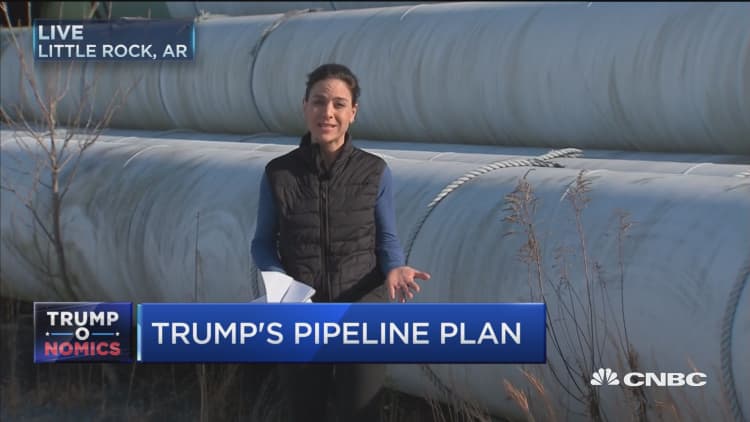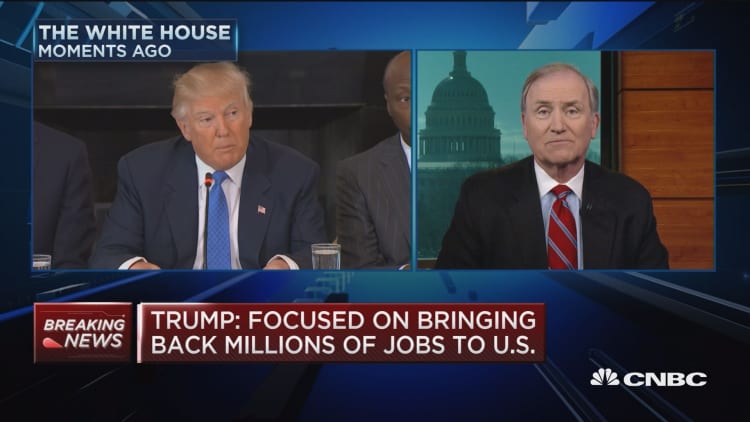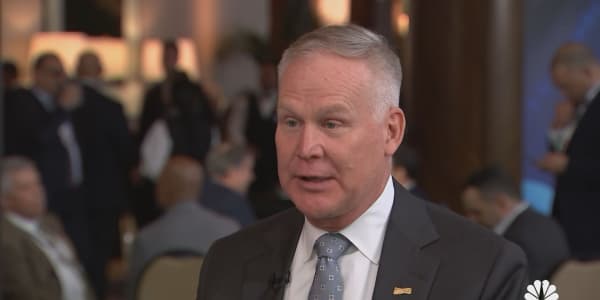Pipeline companies can look forward to four years under a president who trumpets fossil fuels and wants billions spent on infrastructure projects. But even with Donald Trump in office, those hopeful companies will find themselves in a "dog fight" in some areas, experts say.
Firms looking to lay pipe in the South and Great Plains will face few hurdles, but efforts to transport natural gas to the Northeast will have to clear a higher bar. Meanwhile, opposition to pipelines is percolating among environmentalists and regular citizens intent on keeping them out of their neighborhoods.
That movement drew vitality from a months-long campaign by Native Americans to block Energy Transfer Partners from completing its Dakota Access pipeline in North Dakota. Thousands joined the Standing Rock Sioux at camps to oppose the project, and others took action through regional protests and divestment campaigns.

That fight had roots in a more than century-old treaty dispute, making it something of an outlier, but the movement it sparked should not be ignored, said Jay Hatfield, a portfolio manager for InfraCap's AMZA exchange-traded fund, which tracks pipeline companies.
"It would be remiss to not recognize that there's an increasingly radical element of the environmental movement that believes that the ideal solution to the global problem is civic unrest," he said.
Before the Dakota Access standoff, Transcanada's Keystone XL pipeline became a symbol of President Barack Obama's environmental stance. His administration blocked the project, arguing that transporting heavy Canadian crude into the United States undercut American leadership on tackling climate change.
To be sure, the energy industry laid a tremendous amount of pipe during the Obama years. In the first six years he was in office U.S. oil pipeline mileage expanded by 26 percent.
Still, Obama's actions on the two projects came amid a raft of new rules on oil, gas and coal production, feeding the perception of an anti-fossil fuel president.
Following Trump's approval of both projects, pipeline companies are more optimistic but still concerned after coming out of a "really tough regulatory period" for the energy industry, said Libby Toudouze, portfolio manager at Cushing Asset Management.
"It's going to slowly, I think, continue to get better. It was a hurdle and now it's a speed bump," she said.
Pipeline boom … and bust?
The portfolio managers expect the Obama-era pipeline boom to continue in western Texas and basins in central and southern Oklahoma. Drillers will need more capacity there as activity in the low-cast basins ramps up amid a sustained but tepid recovery in oil prices.
Pipelines in that part of the country also tend to run through less densely populated areas, meaning they encounter less resistance from landowners and others. There is also plentiful infrastructure already in place, so new projects tend to be relatively small connections to existing pipelines.
"If you want to find an easier place to build a pipeline in the world, it would be hard to find one better than Texas," Hatfield said. Oklahoma is second on the list, he added.

Pipeline builders won't get such a warm reception in another part of the country: the Northeast.
New England, and Boston in particular, are vulnerable to winter price shocks because they remain under-served by natural gas pipelines. Located near the natural gas-rich Marcellus shale in Pennsylvania, these densely populated areas have long been hotbeds of opposition to pipelines.
"It's going to be a dogfight in the Northeast, for sure," Hatfield said.
Pennsylvanians opposed to Williams Companies' Atlantic Sunrise natural gas pipeline have taken a page from Standing Rock activists, erecting structures in the project's path and threatening civil disobedience.
Last year, the New York State Department of Environmental Conservation blocked another Williams project, the $875 million Constitution pipeline.
Trump's election could affect such disputes. Three of the five seats on the Federal Energy Regulatory Commission are currently vacant, giving him an opportunity to stack it with Republicans who represent the energy industry. The independent agency can override state decisions on interstate pipelines in some cases — though FERC has historically avoided partisan fights.
Another wildcard
Trump has created uncertainty for the industry by saying he will require pipeline makers to use only U.S. steel and American-made pipes in their projects — most recently in a high-profile address to a joint session of Congress on Tuesday night. But it's not clear that the U.S. steel industry can supply that much raw material, at least not anytime soon.





